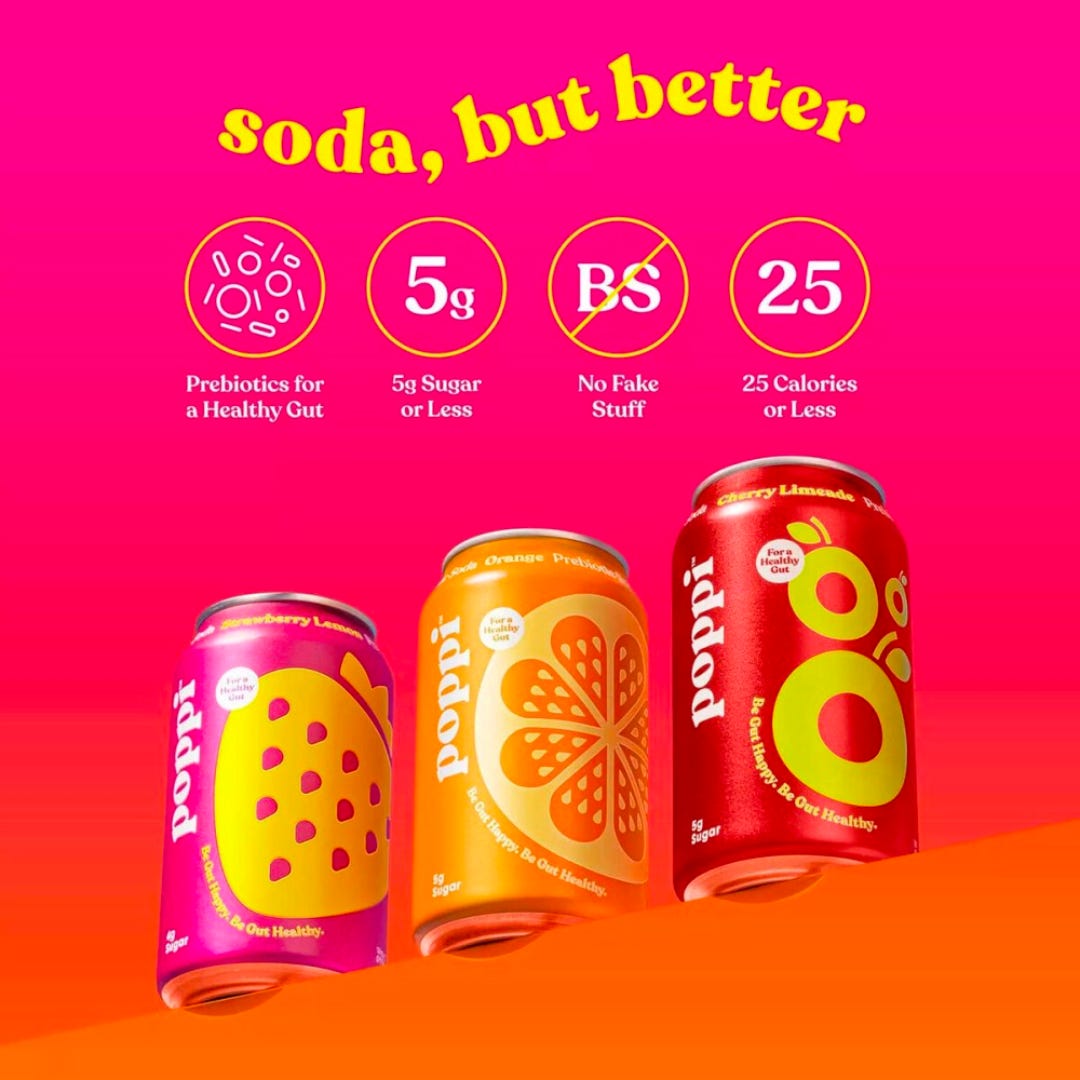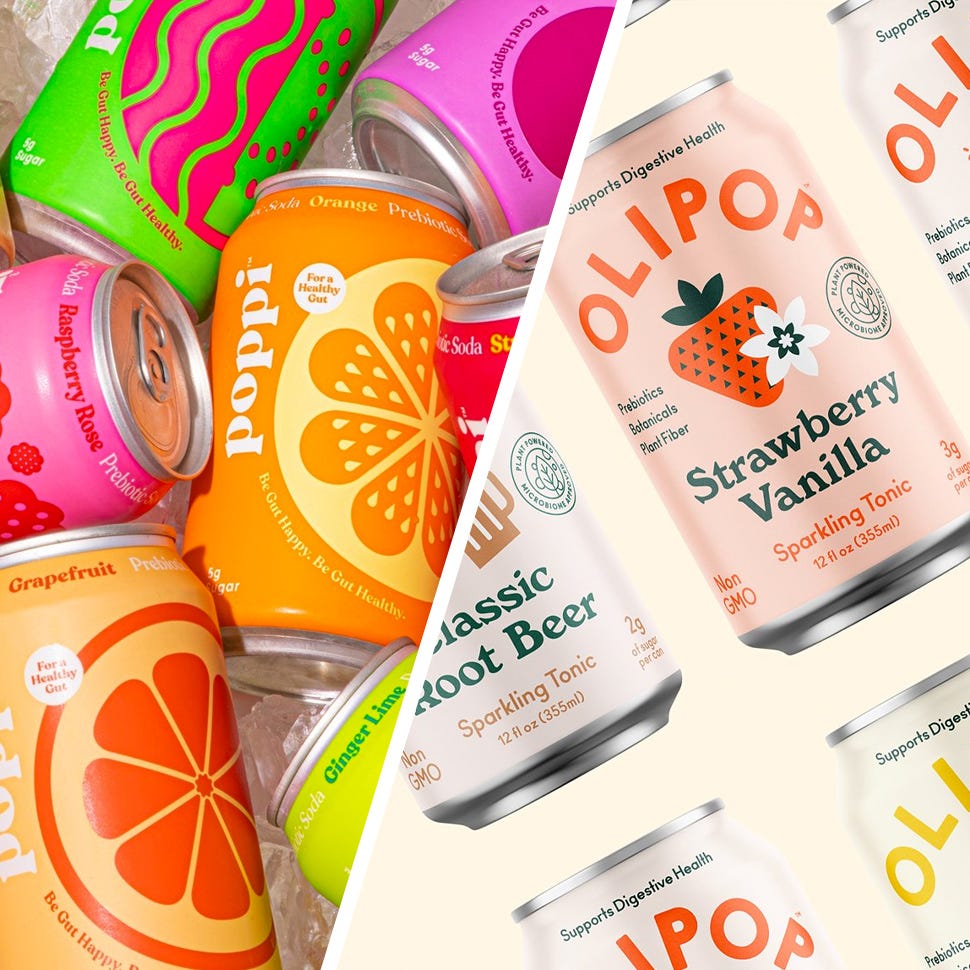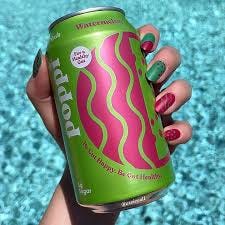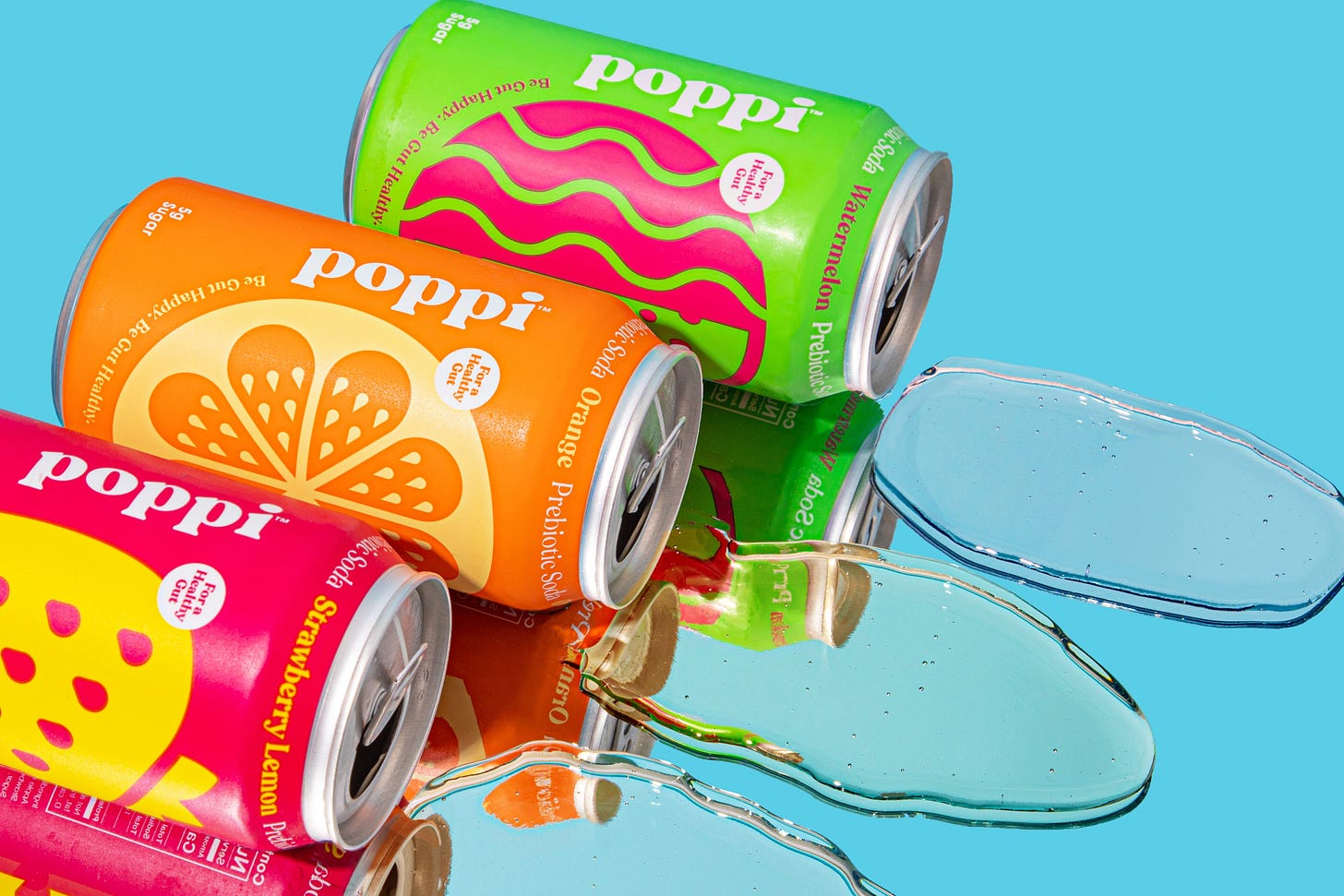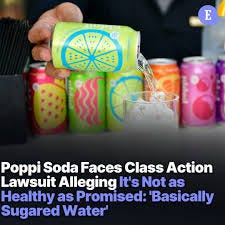Fizz or Fad? Is Prebiotic Soda Worth The Hype?
Poppi faces 5 million dollar lawsuit for false advertising!
It’s been a minute 😳 Well, more like nine months, to be exact. Last year, I started writing as a way to voice my opinions on marketing trends in the health and wellness space.
I’ve been drawn back to the keyboard lately, but I won’t promise a flood of regular posts just yet.
Enjoy this piece while it’s hot..
I adore Poppi (the brand).
Recently, I found myself at a marketing round-table dinner here in London. We went around the room sharing our current favourite brands that we think are nailing it in marketing. My pick? Poppi. Honestly, at that point, I hadn’t even tried their product – I just love their brand.
Let’s start by separating the product from the brand. The product itself, a prebiotic soda, isn’t exactly my cup of tea (too tired to make a joke here). I’ll touch on that later in this article. It’s not that I have a fundamental issue with it; it’s more that it feels like the epitome of a trendy product rather than a necessity.
But the brand? Oh my goodness, I’m obsessed.
Let me explain why I adore the brand, especially compared to its competitor, Olipop.
From my perspective, Olipop (another gut health soda brand) was the trailblazer. They were the first on the market with this 'better for you' soda, and it really took off!
Olipop has a slightly clinical approach with their fonts and colours – evoking a ‘cleaner’ aesthetic, which I’m sure pays homage to their slightly ‘cleaner product’ compared to conventional soda. Their tone of voice also taps into nostalgia, prompting consumers to reminisce about the flavours of their childhood. They’ve clearly identified their target market as millennials and those who grew up in the 90s and early 2000s, drinking soda without a second thought to health outcomes.
Olipop boasts an ingredient list that prioritises gut health over Poppi, with only 2-5g of sugar and 9g of fibre per can. Positioned as a hybrid fibre supplement and a replacement for the beloved soda can, Olipop even runs a Registered Dietitian affiliate program, capitalising on the rise of gut health awareness and the lack of fibre in the standard American diet.
If they can get dietitians recommending their products to their patients as a healthy swap... that's their goal.
I hope I've painted a clearer picture now. Gut health and gut health products are booming, and Olipop has captured millennials with its emphasis on fibre and nostalgia.
Enter Poppi.
Instead of trying to outdo Olipop, Poppi opted to stand out. Olipop’s website could easily be mistaken for a supplement company, while Poppi’s site bursts with colour and campiness – even their models coordinate their nail polish with the flavour of their Poppi cans.
Poppi’s brand exudes youthfulness and fun. They grasp pop culture and thrive in the cultural zeitgeist. They're a tad loud, a tad cheeky, and unapologetically authentic. They adore user-generated content and have nailed influencer marketing and partnerships.
With over 500K followers on TikTok, Poppi leads with a social-first strategy. They deeply understand their audience and communicate effortlessly with them. They're targeting Gen Z and millennials with their playful branding and witty tone of voice. I mean, they even released neon tracksuit merch (which sold out) – tell me that isn’t knowing your audience.
When there’s a trend or pop culture moment, you can count on Poppi to jump on it. And they love a pop-up….
From their recent collaboration with Pop Up Bagels to creating a Poppi House for Coachella featuring Alix Earle, Poppi absolutely owns their brand. They’ve even aired a freaking SUPER BOWL COMMERCIAL!
They understand their customers and speak their language - fluently. They’ve carved out a niche in the market and excelled at building community.
Their value proposition isn’t just about gut health benefits; it’s about reimagining soda as something enjoyable and unapologetic. It’s not clinical; it’s a blast. The brand embraces soda drinking without shame – in fact, it’s cool. They incorporate inulin and apple cider vinegar to create a better-for-you, gut-healthy product.
Now, let’s revisit Olipop for a moment, with their proprietary gut health blend called OLISMART (Cassava Root Fiber, Chicory Root Inulin, Jerusalem Artichoke Inulin, Nopal Cactus*, Marshmallow Root*, Calendula Flower*, Kudzu Root*) – boasting 9g of fibre as their standout USP.
As a consumer, here’s how I see it...
Olipop takes gut health and fibre seriously. Poppi? They’re just having a blast – offering a better-for-you soda alternative (it’s not that deep). And I love that!
But why exactly are they being sued?
Honestly, when I first saw this headline, I couldn't help but roll my eyes a bit. Living here in London as an American, we often hear the stereotype that "suing people is so American." And here we are.
Poppi is facing a lawsuit over allegations of false advertising.
As we've discussed, Poppi has positioned itself as a "better for you" soda infused with apple cider vinegar and inulin. Their cans proudly display slogans like “Be Gut Happy. Be Gut Healthy” and “For a Healthy Gut,” emphasising that each can contains 2 grams of prebiotic fibre.
Now, inulin is indeed a type of fibre derived from agave, recognised as a prebiotic that serves as nourishment for the beneficial bacteria in your gut. However, the lawsuit claims that Poppi's sodas do not contain enough inulin to substantiate the advertised gut health benefits.
This is the point at which I feel torn. As a marketer - I clearly love Poppi and admire what they’ve accomplished. But as a dietitian, I’m always sceptical…
Enter Kristin Cobbs, the plaintiff behind the $5 million class action lawsuit aimed at compensating consumers affected by these allegedly misleading advertising claims.
It does strike me as a touch dramatic, but credit to Kristin Cobbs for holding brands accountable and potentially setting a legal precedent.
I'm genuinely curious to see how this unfolds! Will Poppi alter their marketing and claims? Might they enhance their formulas with more gut-friendly ingredients? And most intriguingly, how will this lawsuit fare in court? Settlement or standoff?
But what truly piques my interest is...
What impact does this case have on the 'better for you' FMCG market?
I mean, there’s nothing trendier these days than products that promise to be ‘good for your gut’, ‘high in protein’, or claim to ‘balance your hormones’ and ‘improve your sleep’. The wellness industry is still booming, but will it ever reach its saturation point?
If you have a concern, there are literally millions of products clamouring for your attention with just a quick Google search. And don’t get me wrong, I genuinely believe some of them are fantastic. I personally use plenty of health products.
But here’s my real question: do we really need them? Do we truly need a beverage that tastes like soda but is also purportedly good for our gut? And when we say "good for your gut," are we implying this product will genuinely enhance your health, or is it simply "better than the alternative"?
While I understand that for those who consume sodas daily, sometimes multiple times a day, these 'better for you' products may seem like a healthier swap and a step in the right direction. As a dietitian, I have reservations about whether they genuinely improve health. It's possible they yield better outcomes simply because they replace the original, which we know isn't optimal for health, especially in large quantities.
If you enjoy the occasional soda, I think it’s perfectly fine to leave things as they are. Personally, I don’t advocate consuming gut-healthy sodas with the sole aim of improving your gut microbiome. While a cola-flavoured Poppi may be a better choice than an original Coca-Cola in terms of gut health benefits, I believe there are more effective ways to support gut health—like enjoying a quinoa salad with roasted vegetables, topped with a tahini dressing and pumpkin seeds 😏
However, I do know that James Clear so eloquently claims that one way to improve your health are direct swaps. It’s so much harder to introduce a new habit, but a great way to do this is by introducing better swaps for habits that already exist. So, in that case, a function prebiotic soda may in fact be the thing you need.
But for the average health-product consumer, do these products simply just have allure and innovation or do they have staying power?
Is it a ‘nice to have’ in your pantry or a weekly food shop staple?
Here in the UK…
I see the likes of Fhirst (probiotics + prebiotics), Hip Pop (probiotics + prebiotics), and Living Things (prebiotic soda)…all of which have pretty similar ingredients to Poppi. And some of them have recently secured investments from notable funds 👀
Will they be taking a leaf out of Poppi’s book to avoid a law suit or are Brits just not the kind of people to file a class action law suit?
Overall…
What do you think about:
Poppi’s brand
The lawsuit
The “better for you” market and their health claims
Thanks for reading and I’d love to hear your thoughts below!



